Renogy’s groundbreaking REGO 104Ah super slim semi-solid-state battery is poised to make your LiFePO4 lithium battery a relic. Step aside, AGM. Look out, lithium. Solid-state is the future.
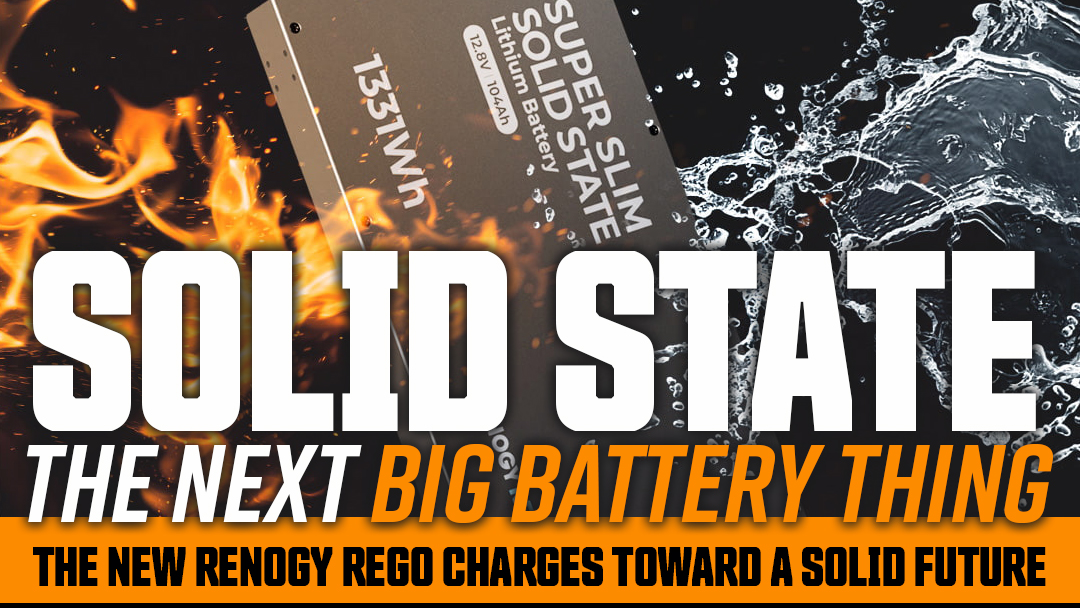
Thirty years ago, AGM batteries were exotic and expensive. Only high-end RV builds and extreme off-grid users were willing to pay the $400 to $700 USD price ($840 to $1,469 today) for the fully-sealed, maintenance-free, faster charging, and slightly more capacity of AGMs. In comparison, the tried and true lead-acid batteries were $80 to $120 USD each ($167 to $251 today). For most, the benefits were not worth the cost.
Thankfully, high-quality AGM batteries came down in price by the mid to late 2000s. Rather than being upwards of five times the price of their lead-acid competitors, they were only two times the price. At the same time, solar panels had gone mainstream in the RV marketplace making the benefits of AGM batteries even more alluring.
In the early to mid-2010s, companies like Battle Born and Relion brought the first 100Ah lithium (LiFePO4) batteries to the RV world. First adopters paid between $2,000 and $3,000 USD ($2,698 to $4,047 today) for the first generation 100Ah lithium batteries—a multiple of even the most expensive AGM batteries at the time. For most consumers, the significant lithium advantages in lifespan, deeper capacity, light weight, faster charging, and no maintenance were tough to justify at five to ten times the cost.
Thankfully, a high-quality 100Ah lithium battery today sells for between $800 and $1,000. Not only have the materials and technology come down in cost, but companies like Battle Born, Renogy, Victron, and Lion Energy compete and drive the cost down even further. Lithium batteries are still more expensive than AGM and lead acid, but their advantages make a much more compelling case at the lower price points.
This past April, Renogy announced a Super Slim solid-state lithium battery. Technically, Renogy’s new battery is a semi-solid-state battery, but we’ll get to that in a minute.
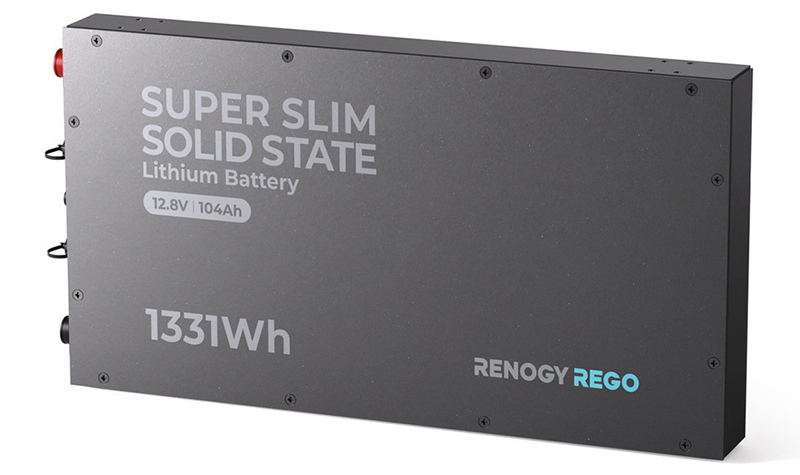
What is a solid-state lithium battery? In a nutshell, solid state lithium is the future of batteries.
Solid-state lithium batteries (aka SSLBs) replace liquid or gel electrolytes with solid materials. Solid-state batteries can store significantly more energy per unit of weight and volume than our current liquid or gel lithium-ion batteries. Solid-state batteries are non-flammable and thus do not catch fire if punctured, overheated, or overcharged. Finally, solid state batteries are also better at withstanding heat, vibration, and cold with ratings down to 14 degrees Fahrenheit (-10 degrees Celsius).
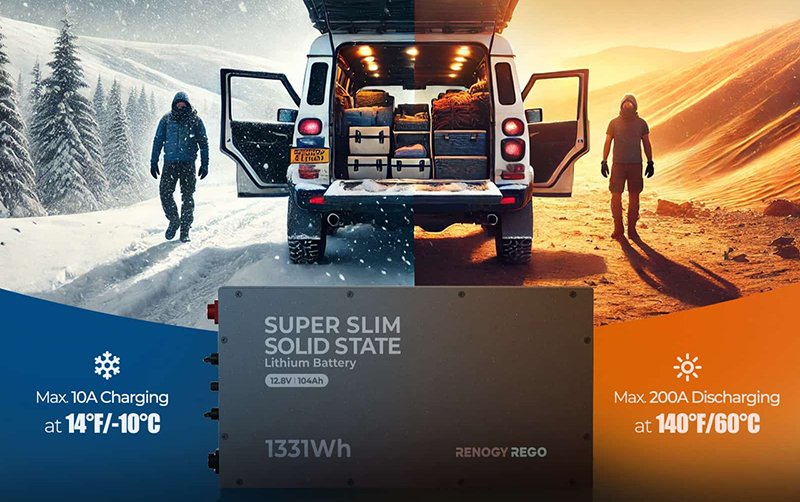
The problem is—as you likely guessed—that solid-state batteries are currently expensive, even by lithium battery standards. They are difficult to manufacture at scale, although major manufacturers like Toyota, Samsung, and many others are racing to solve those challenges.
We were honestly a bit shocked when we saw Renogy’s REGO 12.8V 104Ah Super Slim Solid State Lithium Iron Phosphate Battery announcement earlier this year. From everything we had heard, we were still years away from a commercially viable solid-state battery for the RV market. Then we dug a bit deeper and found the asterisk.
Renogy’s new battery is a semi-solid state lithium battery. Put another way, 90 percent of the battery is solid electrolytes. Semi-solid-state batteries are easier to manufacture than pure solid-state batteries, but still offer superior safety specifications and energy density to current lithium batteries. The implications of this battery for the truck camper industry are very interesting indeed.
The Renogy REGO is 17.7 inches wide, 10.5 inches tall, and 2.4 inches thick. Imagine a large laptop that was 2.4 inches thick, and you get the idea. That shape and size allow the REGO to be potentially placed in areas where traditional Group 27 and Group 31 batteries would not fit.
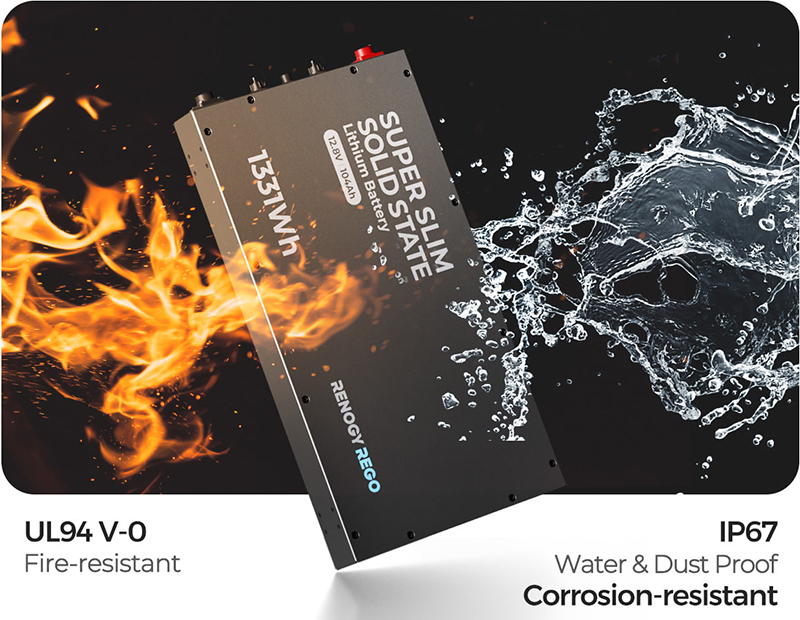
Another important consideration is physical volume. The REGO is 448.56 cubic inches versus 732.4 cubic inches for a Group 27 battery and 830.5 cubic inches for a Group 31 battery. If your battery compartment is wide and tall enough for the REGO, you could stack nearly twice the number of batteries (compared to Group 31). The REGO is also a few pounds lighter than the lightest Group 31 lithium batteries.
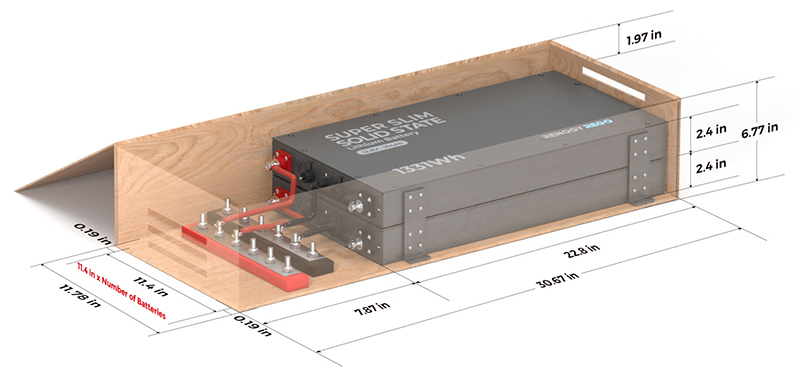
For truck campers, this means packing the same amount of power with less space and weight, or packing even more power in the same space, or packing power in places we never thought possible before.
The REGO also offers a high continuous discharge rate (200A) versus the 100A typically available from standard LiFePO4 batteries. This is better suited for powering larger inverters or multiple heavy loads. The lifespan is also reported at approximately 6,000 cycles for a huge gain in long-term performance.
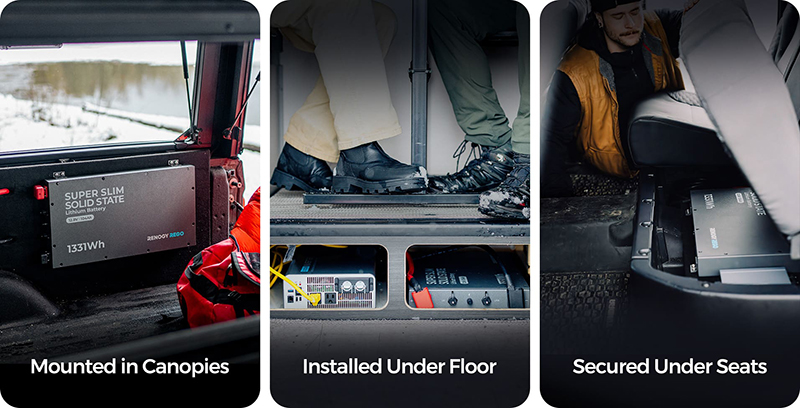
The REGO battery can also be charged down to 14 degrees Fahrenheit (-10 degrees Celsius). This is a critical improvement over LiFePO4 batteries that typically can’t charge below freezing without built-in heaters. The REGO is also fire-rated (UL94 V-0) and IP67 waterproof for improved off-road durability and safety.
Finally, the cost isn’t the delta we’ve seen from battery technology leaps in the past. On the Renogy website, the REGO 12.8V 104Ah Super Slim solid-state battery is listed at $2,000 US, but then marked down to $1,500. Yes, that’s roughly $700 or so more than an equivalent high-quality 100Ah lithium battery, but it’s not triple or more like we’ve seen from battery technology leaps in the mid-90s and 2010s.
If the pattern we’ve seen over the last thirty years is any indication, semi or even fully solid-state batteries will come down in cost, improve in capacity, and go mainstream in the RV marketplace within a decade.
For now, the REGO hints at what’s coming. The future of batteries is solid.
